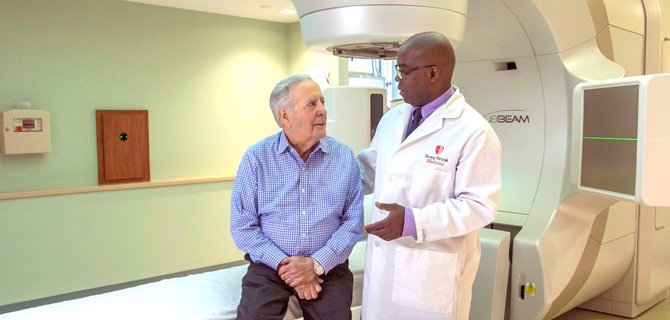Approximately two weeks after your first treatment you may begin to experience side effects or symptoms caused by radiation therapy. These symptoms may continue throughout the treatment period, and gradually disappear during or after you have completed treatment. Your doctor will tell you which symptoms you are likely to experience, when you will notice them and how long you will experience them. It is important to follow the appropriate instructions to minimize your discomfort.
The most common side effects in patients receiving radiation therapy are:
SKIN REACTIONS:
- After 10 to 12 treatments you may develop some irritation and redness which may itch. There are several things you can do to minimize this.
- Wash hair and scalp very gently with baby shampoo, brush or comb very gently.
- Apply pure Aloe Vera gel to forehead and around ears to diminish sunburn reaction.
- Inform you doctor or nurse if skin is very itchy and the Aloe Vera is not helping. A prescription medication may be needed.
HAIR LOSS:
Radiation to the scalp can cause loss of hair in the treated area. The hair loss will occur about two weeks after treatment has started. Hair will usually begin to grow again 2 to 3 months after treatment is over. Some patients may find that the new hair growth is thinner or more sparse than before and the texture or color may have changed.
UNTIL HAIR LOSS OCCURS:
- Pat dry with a soft towel, avoid hair blowers or dryers.
- Avoid the use of curling irons, curlers, hair bands, clips and hair sprays.
- We encourage you to get a wig before hair loss occurs. This makes it easier to match your hair and you will have it ready when it is needed.
WHEN HAIR LOSS OCCURS:
- We suggest the use of a scarf, hat or wig in order to protect your scalp from sun or cold.
- Expose the treated area to the air as much as possible. However, while under treatment, avoid exposing the scalp and head to dramatic temperature changes, direct sun or direct heat, including a sun lamp.
FATIGUE
During radiation therapy, the body uses a lot of energy. Stress related to your illness, daily trips for treatment, and the effects of radiation on normal cells all contribute to fatigue. The amount of fatigue varies with each person and generally will go away when your treatment is completed. We recommend that you pace your activities and plan for frequent rest periods to avoid becoming overtired.
If you have someone available to help you clean the house, shop or cook meals, take advantage of their help while you feel fatigued. If you live alone and are too tired to cook a full meal, try some of the well-balanced frozen dinners.
CHANGES IN BLOOD COUNTS
Blood counts will be monitored weekly or more often if large areas of bone marrow are in the treatment field. The radiation affects the body's ability to reproduce white blood cells and platelets (which are made in the bone marrow) at a normal rate. Therefore, a treatment break may be needed to prevent the possibility of infection and bleeding if these counts get too low. If you are receiving both chemotherapy and radiation therapy, you may have to have your counts checked more often. Your doctor or nurse will let you know if your counts are changing and what to do if this happens.
OTHER SIDE EFFECTS
It is possible that other less common side effects may occur. Tell your doctor or nurse if you notice any decrease in hearing, stuffiness or pain in your ears. They can recommend medication to minimize the discomfort. Remember these side effects are temporary.
MEDICATIONS
While you are receiving treatment, you may be taking a medicine called Decadron (dexamethasone). This medicine decreases the swelling and inflammation caused by the tumor and radiation. You need to know the following about Decadron:
- Decadron may cause an increase in appetite, increased urination, fluid retention (swelling), leg cramps, and mood changes. These are expected and temporary effects of the drug, but should be reported to your nurse or doctor
- DO NOT take this medicine on an empty stomach. DO take it with food or milk, or prescribed antacid medication During treatment, your doctor will, over a period of time, decrease the amount of Decadron.
- DO NOT decrease or stop this medicine without being instructed to do so by your doctor.
Feel free to direct any questions and/or concerns you may have related to your treatment to your primary nurse and physician. The phone number is (631) 444-2328, Monday-Friday, 8 am to 6 pm. Evenings, weekends, and holidays, please call (516) 783-1610.


